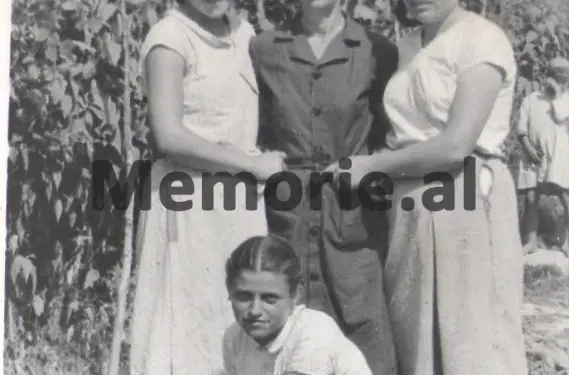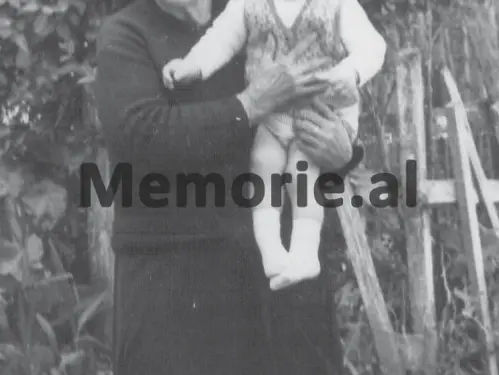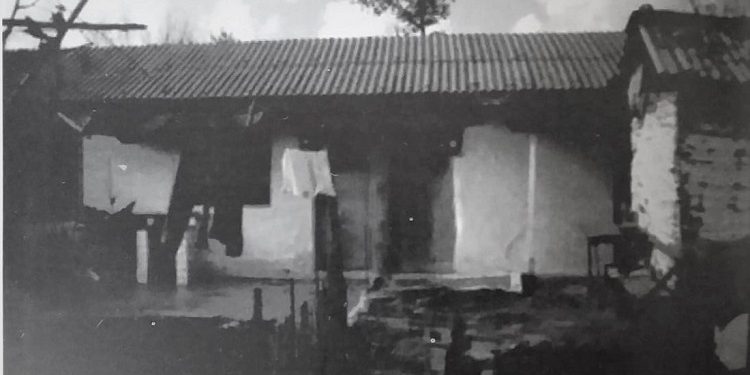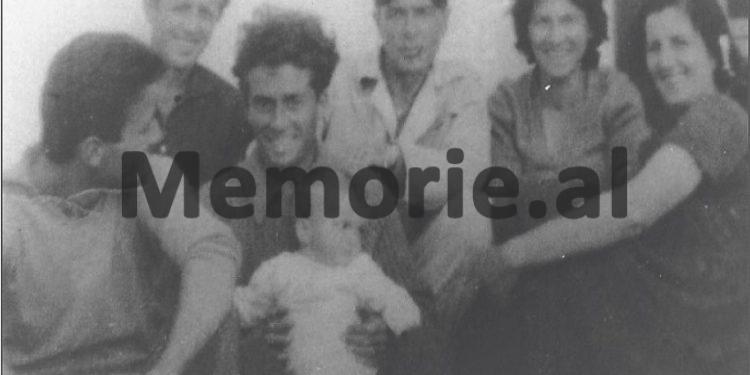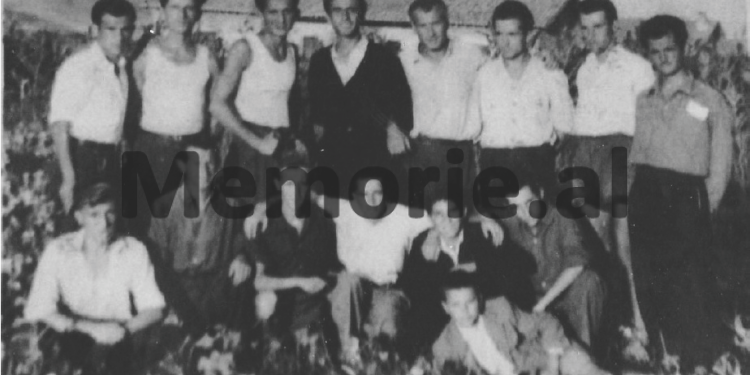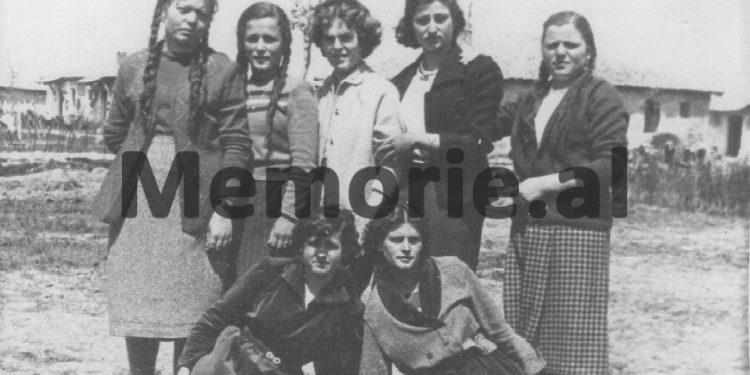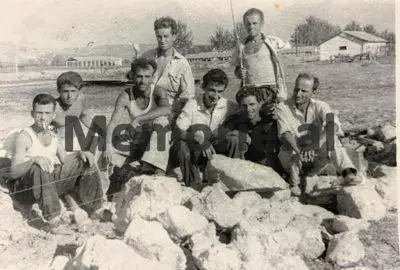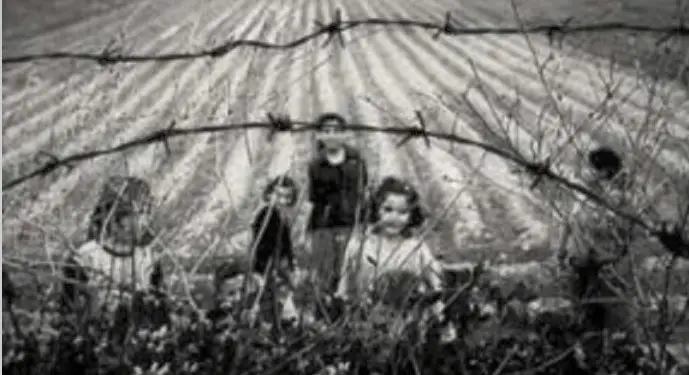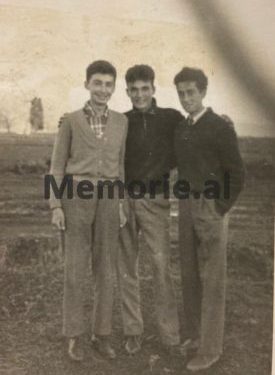By Eugene Merlika
– LOVE LOCKED –
(Instead of preface)
“Lala’s daughter, son, was adopted
Mori beautiful and angry
Why did you take me to the past”?
Gavril Dara, the Younger
Memorie.al/ The verse novel “Cain and his sons”, by the poet Zef Pashuk Mirakaj, brings to mind the already distant past, Albania of the 1960s and 70s, with all the shades of colors. its dark, while to the young one, born in the 80s, it presents a surreal tableau, a kind of absurd theater, where dramas are played out of any logic, no matter how simple. The events take place in a rural town of Myzeqe, a place known for its internment sectors and the severity of the so-called “class war”.
The novel has two main lines of action that run parallel but also interrupt each other at certain points. The first is the love of a boy exiled in a village, with a young citizen girl who works as a teacher. The second is that of the activity of the all-powerful State, for which the individual with his spiritual world is worth nothing, it is only a number framed in his diabolical plans, which must be established point by point. In the novel, the official state with all party and state institutions is in the shadows. He is represented by his darkest part, that of organized crime, the most loyal spokesman of the dictatorship, the State Security.
The author defines with the term “shadows”, the trusted people of the regime who act in the dark, in secret, who decide the fate of people, from the most simple to the courtiers, who their compatriots divide into two groups, in: ” our people” and in “enemies”. For the former they always have a watchful eye, because the theory of the great leader says that they can degenerate, join the latter, while for these the sword is always sharpened that cuts mercilessly, that spares nothing, neither feelings, nor dreams, neither the lives of people who don’t care about anything, nor the innocence of a child, nor the weakness of an old man, or a woman.
The two lines of the novel represent two different worlds that clash with unequal weapons. The first is that, the eternal world of love, of that feeling which the creator gave to the inhabitants of this planet to ensure the continuity of the human race in it. The second is the violence of the State, an institution created to maintain the balance of different relations between citizens through laws. As according to the previous norms of law, the State and the citizen must have interdependence in some spheres of their activity, but independence in other spheres.
These two include intimate life, love relationships, marriage and family. These criteria have not always been respected; the state has not always remained without interfering with its force, in different forms, in the intimate and family life of citizens. The sporadicity of this phenomenon in past societies turns into a massive and fringe pressure in the Communist State, especially in the Albanian one. The family, the basic cell of society, its DNA, in the communist system, becomes a political variable that determines, as the case may be, its formation and destruction, with often tragic consequences on the spiritual world of citizens.
The author of the novel in verses, “Cain and his sons” elaborates a case of the occurrence of the phenomenon, one of many proven in the “proletarian” kingdom of Enver Hoxha, but the drama takes on a general character, with all its specificity. At the center of the novel, which, in terms of style, resembles more a work of 18th century sentimentalism than a product of the globalized electronic century, there are two young people who come from different social conditions and have positions equally different.
Admir is an exiled boy, one of those for whom everything is predetermined from birth, from the last name he bears. His life takes place in a narrow framework, with few components, under constant supervision. The paths of studies have been closed, with deep pain he realized that in this system where he lives, he will always remain a being of the second category, without rights, without perspective, without hope. Life makes him swallow every day bitter bites and tears that should not be seen outside. Everything is kept inside, because any counteraction would worsen the situation.
The writer has a weakness for his characters, he draws them in strong colors, they wear qualities to be envied, it seems as if he takes them out of the myths of antiquity and grafts them into the gloomy reality of his era.
“Hijeshín, I get inheritance from Leandri
Nestor the gift of wisdom.
Squetsín, inherited from the tribe.
Bujarín, motto to kill the vorfní”.
This is how Admir is described, with prominent physical, spiritual and intellectual gifts that make him stand out in his social circle. These gifts, in the gloomy context of the life of the modern slave, in the figure of the improvised farmer, create powerful complexes of despair, which are precursors of strong spiritual crises.
By making a comparison between those living conditions and those of the contemporary world in which depression, as a clinical phenomenon, increasingly assumes large proportions, it would be difficult, perhaps impossible, for the psychologist or sociologist to speculate on the basis rational, the reasons for the psychic endurance of those peoples. The stress of post-industrial societies is fun compared to the anxiety and terror in which the citizens of “socialist paradises” lived, especially the so-called “class enemies”.
In that dark tunnel that was Admir’s life in the age of dreams, a light appears to him, after which he is caught by force. This light originates from a young girl, whom he accidentally sees on the street and instinctively begins to follow. Very soon that girl becomes the center of the universe, around which dreams, illusions, hopes to change life, to give it space, breathing, meaning revolve. That girl’s name is Leonora. Perhaps the poet borrowed that name from a well-known poem by Edgar Allan-Poè, from the lines “Rare and beautiful girl/ that the angels tell Leonora”. While completing the image of the character, with the image of the goddesses of the ancient world:
“Her name was Leonora,
But you wanted to be yourself, Aurora”.
Leonora is for the author the personification of female beauty, a being created solely by God to radiate light. The two characters, in terms of appearance and internal formation, constitute a special one, they are separated from the usual level and it seems as if they were created for each other.
The origins of the families are different and, despite the good will of the poet, this fact constitutes a possible obstacle in the way of their love. Admir is the son of a well-known family, who was part of the nation’s elite, while Leonora was:
“The daughter of a craftsman
That time had cut them off”.
In a normal society that inherited a certain conservative mindset in that direction, this would have had the effect, to some extent, of making their union difficult, but it would not have been an insurmountable obstacle. In the current conditions of their acquaintance, the premises are completely reversed: Admir is the official “enemy” with the farm, a certain gogol who serves to scare people, while Leonora is the “daughter of the party”, a teacher to whom she entrusted the education of the children . Apparently, the undertaking of their union is impossible, but the author will believe in the power of love and is optimistic.
Love is born at first sight; it is an overwhelming feeling that plunges both of them into its vortex. From that point of view, everything changes for the heroes of the novel. The lack of contact, distance is like the wind that blows the hot fire, but instead of extinguishing it, it turns it into a big fire. From the fatal moment for Admir and Leonora, time, space and environment lose their meaning and undergo a transformation that bears the face of the partner. Everything rotates moves or stays in place according to the moments of encounters.
Not by chance, the author places these moments in a library, as if he wants to enrich the framework of the characters with the presentation of their intellectual interests. That feeling that, until the moment of the library, had been a tangle of desires, conjectures, doubts, and passions takes its true form in their confrontation. Love is no longer just physical attraction, passion, it is also mutual respect, esteem, and understanding, elements that cement and make stable a relationship that can often be the spontaneous product of a moment.
Thus, their spiritual worlds intertwine and complement each other, creating that miracle oasis that in the life of humanity has been the shelter in which many, of the billions of people who have passed over this earth, have found moments of happiness. The main characters of the novel live the ecstasy of happiness, the spring of their lives next to each other. Their meetings, although rare, take place in the wheat fields near the city, under the sky sown with stars, in the silence of the night that is broken by the act of love. They are the culminating points of an existence that finds its quintessence only in them.
“Tonight we belong to the Universe
Tonight we will leave our land.”
This is how a poet would express himself years later, about such love. So far everything is poetry, a feeling that has inspired the masterpieces of world literature. But in a country ruled by the sons of Cain, the fratricide, with the mindset of violence and hatred, this poem cannot have a long life. It resembles a plant that grows in a desert, which the warm wind and lack of water cause it to wither quickly.
The love of Admir and Leonora becomes one of the main objects of the State Security, which feels challenged in its criminal mission of surveillance and limitation of the “class enemy”. The chases, the calls, the pressure on the lovers begin, who have to fight with a huge machine that grinds everything. Here the novel enters its dramatic phase, in which the conflict is ever increasing until it approaches tragedy.
Love is doomed not to have its logical conclusion because it conflicts with the unwritten laws of a society that bases its being on violence, on unique thinking, on the lack of freedoms, on the arbitrariness of a caste of criminals who are in charge her. It already begins its confrontation with the system of violence, which justifies even the most immoral and criminal means to achieve the goal. The arrest of Admir and the recruitment of Leonora as an accomplice are being prepared with the aim of turning her into an accuser of her lover. It is the usual practice of the “shadows”, borrowed from an experience that came from afar, from the cursed offices of the Moscow Lubyanka that planted state terror in more than half the world.
Now the powerful feeling succumbs to the cold reason that elaborates the inevitable consequences, if its challenge to the forces of darkness is to continue. The decision must be made by Leonora, because she is faced with the Hamlet dilemma: to live or not to live. If her spiritual world has only one pivot, if her heart knows only one god (You are the best in this world / I see a lot of nobility in you), would a life without Admir be like that, in the literal sense of her, or would she return to an empty existence, to the point where she would envy death?
On the other hand, joining him for life, what price did it demand for herself and her family? Would she be able to cope with the toil and physical exhaustion of the life of an agricultural worker and, at the same time, the gnawing of her conscience for the consequences on her parents? And if Admir, like many “dangerous enemies”, would end up in prison, how would she end up? A tangle of questions and problems, which would bring even a man with gray hair to his knees, also determines the decisions. Admir has nothing to lose, the union with Leonora, crowns the dream of life “But, I wish I had you without me / all the dreams, you will be destroyed”. The complex of responsibility for the difficult and sacrificial future of his girlfriend restrains him as well.
Before a two-way pressure from the organs of violence, the two young people decide to stop the meetings. Contacts continue through messages and letters secretly brought by Lili, Admir’s cousin. Unfortunately, they also have an end, because Lili, as the “daughter of the enemy”, is expelled from school for political reasons in the ninth grade and can no longer meet Leonora. This is another episode that sheds light on the endless abyss of absurdity, in which Albanians lived for half a century. This abyss cannot be conceived and, even less, understood by foreigners, and if these kinds of literary works were absent, it would also disappear from the memory of our children.
“There will be no boy in the world for me
if they won’t let me;
I am determined, without any fear:
Nine lives if I have them,
I will stay loyal to him”
This is the steadfast decision of the heroine of the novel. The author tells us that she implemented this decision and did not introduce any other man into her life. This attitude brings her closer to the heroines of romantic-sentimental literature of the past centuries and is somewhat rare and even incomprehensible for the inhabitants of the Western world of the XXI century, even for Albanians. Is this attitude right? Can self-sacrifice to this degree be justified, to compensate for the lack of courage to face an extremely difficult life?
The author does not take a stand, he cannot reprimand his creatures, he is very much in love with them and leaves this task to the cold judgment of the readers. But whatever this judgment is, he strongly accuses strikes and sues that order of things established in the system, which gives itself the right to determine the course of people’s intimate lives. This also represents the greatest value of the novel, the reflection of a black era, which took on the color and smell of blood on his homeland, which passed over mountains of corpses and oceans of human tragedies.
For this entire cataclysm that Albania and the Albanians suffered, no one answered, no one paid, no one even apologized, because no one called themselves guilty. The world to which we tend to go and take as a model justified such injustice, even justified it not in the name of Cain but of Christ…!
The novel in verse approaches its conclusion, which is conditioned more and more by the tragic dualism of Leonora’s soul and by the diabolical, unscrupulous, unlimited violence of the Communist State, which finds precisely in it the essence of the meaning of its existence. The love of two young people does not have the power to stay; it breaks under the heavy pressure of the police state, and to some extent Leonora’s reluctance to “cross the Rubicon”.
For the common reader, whether he is a contemporary of the characters or born a few decades later, a spontaneous question would be natural: do the heroes of the novel, especially Leonora, have a clear conscience that they fought hard to protect their love? Was there room in their history, as well as in that of their generation, for a guilty conscience that the resistance to the dictatorship should have been stronger? That if we had acted like that, even at the price of sacrifice, that dictatorship would not have the courage to enter the bedroom of the citizens?
The author gives the reader the opportunity to ask and answer, he tries to keep his creatures clean, spotless, and special as he drew them from the beginning. He achieves this, ending his work in a symphonic crescendo, reaching the climax of the conflict and, at the same time, its resolution at its end, through Leonora’s letter to Admir. This letter, which the poet writes in prose, I think is the most beautiful part of the work, quite qualitative in style, deep and abundant in ideas and feelings, very elegantly performs the function of protecting the characters against any reproaches, accusations or insinuations about their behavior and decisions.
I don’t think it’s appropriate to go into the analysis of that letter, because I don’t want to spoil the reader’s curiosity, which should be independent in its assessment. I am convinced that anyone who reads it will be moved, revolted, but will also reflect on it for a long time. This is one of the basic functions of a literary work, and I think Mr. Zef Mirakaj should be congratulated because he has achieved his goal.
“Cain and his sons”, I think is another step forward for the author in Albanian poetry and a great help in dealing with the theme of the communist dictatorship, in its true terms. Memorie.al
June 2007




